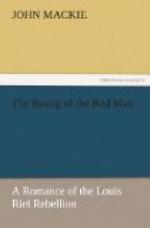“Bah!” he continued after a pause, “the metis are ungrateful dogs, and the Indians, they are mad also. I would like to take them one by one and wring their necks—so!”
The rancher tried to conceal the concern he felt. His fifty odd years sat lightly upon him, although his hair was grey. His daughter had only been back from Ontario for two years, but in that time she had bulked so largely in his life that he wondered now how he could ever have got along without her. She reminded him of that helpmate and wife who had gone hence a few years after her daughter was born, and whose name was now a sacred memory. He had sent the girl down East to those whom he knew would look after her properly, and there, amid congenial surroundings, she grew and quickened into a new life. But the spell of the vast, broad prairie lands was upon her, and the love for her father was stronger still, so she went, back to both, and there her mind broadened, and her spirit grew in harmony with the lessons that an unconventional life was for ever working out for itself in those great, unfettered spaces where Nature was in the rough and the world was still young. She grew and blossomed into a beautiful womanhood, as blossoms the vigorous wild-flower of the prairies. When she smiled there was the light and the glamour of the morning star in her dark hazel eyes, and when her soul communed with itself, it was as if one gazed into the shadow of the stream. There was a gleam of gold in her hair that was in keeping with the freshness of her nature, and the hue of perfect health was upon her cheeks. Her eighteen years had brought with them all the promise of the May. That she had inherited the adventure-loving spirit of the old pioneers, as well as the keen appreciation of the humorous side of things, was obvious from the amount of entertainment she seemed to find in the company of Old Rory. He was an old-timer of Irish descent, who had been everywhere from the Red River in the east to the Fraser in the west, and from Pah-ogh-kee Lake in the south to the Great Slave Lake in the north. He had been voyageur, trapper, cowboy, farm-hand in the Great North-West for years, and nothing came amiss to him. Now he was the hired servant of her father, doing what was required of him, and that well. He was spare and wrinkled as an old Indian, and there was hardly an unscarred inch in his body, having been charged by buffaloes, clawed by bears and otherwise resented by wild animals.
“Rory,” said the girl after a pause, and the softness of her voice was something to conjure with, “what do you think? Are the half-breeds and Indians going to interfere with us if they do rise?”
“Thar be good Injuns and bad Injuns,” said Rory doggedly,” but more bad nor good. The Injun’s a queer animile when he’s on the war-path; he’s like Pepin Quesnelle’s tame b’ar at Medicine Hat that one day chawed up Pepin, who had been like a father to ’im, ’cos he wouldn’t go stares wid a dose of castor-oil he was a-swallerin’ for the good of his health. You see, the b’ar an’ Pepin used allus to go whacks like.”




